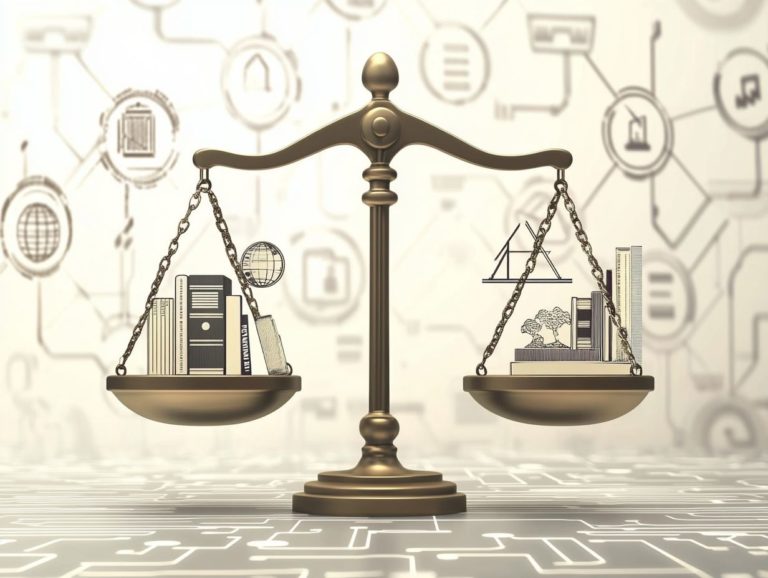How to Navigate International IP Disputes
Navigating the realm of international intellectual property disputes can feel overwhelming for businesses and individuals. As the global marketplace expands, understanding IP rights across various jurisdictions becomes essential.
This overview delves into international IP disputes, clearly defining the scope and examining common types, such as patent infringement, trademark dilemmas, and copyright violations. You ll discover practical steps to tackle a dispute, alternative resolution methods, and strategies for enforcing your rights on a global scale.
Whether you re an entrepreneur charting new territory or a legal professional navigating complex waters, this guide is designed to empower you with the knowledge needed to manage and resolve international IP challenges effectively.
Contents
Key Takeaways:

- Understand the scope of international IP disputes and the common types, including patent, trademark, and copyright disputes.
- Gather evidence and choose the right jurisdiction when facing an international IP dispute.
- Consider alternative dispute resolution options like mediation and arbitration, and work with local counsel to enforce IP rights internationally.
Understanding International IP Disputes
International IP disputes cover a broad spectrum of conflicts related to intellectual property rights between parties in different countries. This highlights the importance of adhering to various laws and recognizing cultural nuances, as well as understanding how to protect your IP internationally.
Such disputes often involve intricate legal documents and require a thorough understanding of enforcement mechanisms to safeguard rights across borders. This complexity reveals the nuances of cross-border negotiations and litigation.
As your business expands globally, disputes become more likely, making it crucial to grasp the landscape of international IP law.
Definition and Scope
The definition and scope of international IP disputes include legal conflicts over intellectual property rights between parties from different nations, emphasizing the complexities of their resolution.
These disputes can involve various forms of intellectual property, such as trademarks that distinguish brands, copyrights that safeguard creative works, and patents that secure groundbreaking innovations. Each type of intellectual property is governed by distinct international treaties and national laws, complicating enforcement across borders.
You may find yourself entangled in lengthy litigation processes influenced by the jurisdictions at play and the specific legal frameworks that apply. The stakes can be high; infringement could jeopardize your market position and revenue, driving companies to pursue rigorous international protection of their intellectual assets.
Common Types of International IP Disputes
International IP disputes can take many forms, with patent infringement, trademark disputes, and copyright infringement being the most prevalent. Each of these issues presents considerable challenges in global IP management, requiring careful navigation and strategic consideration.
Patent Infringement
Patent infringement involves the unauthorized use, production, or sale of a patented invention and is a significant concern in international intellectual property disputes. This reality underscores the importance of proper legal documents and effective enforcement strategies.
This complex area of law often comes to the forefront in high-profile cases, especially the ongoing clashes among tech giants over smartphone innovations. These disputes illuminate the complexities of patent claims and reveal serious ramifications for businesses that violate these rights.
As you navigate the landscape of operating across different jurisdictions, you’ll encounter a range of legal challenges, including diverse interpretations of patent laws and varying enforcement mechanisms. The repercussions of infringement can be severe think hefty fines, injunctions, and damages that could jeopardize your business’s existence.
To add another layer of complexity, international agreements like the TRIPS agreement, which stands for Trade-Related Aspects of Intellectual Property Rights, significantly influence patent legislation and enforcement on a global scale, ensuring that innovation flourishes while safeguarding inventors rights.
Trademark Disputes

Trademark disputes occur when there s a clash over usage. These often involve claims of infringement.
These conflicts can take many forms. For example, two companies may have logos or brand names that risk confusing consumers. Picture a well-known beverage brand facing a challenge from a startup that s adopted a similar name in another region this could lead to significant consumer confusion.
Conduct thorough trademark searches before launching your products. This helps you avoid legal issues.
Compliance plays a vital role, as local laws can vary widely, influenced by cultural perceptions of what constitutes infringement.
Understanding these factors helps you resolve disputes effectively and safeguard your brand in today s competitive market!
Copyright Infringement
Copyright infringement happens when you use material without permission. This can lead to serious legal challenges in international law and intellectual property.
This issue often surfaces in various scenarios, such as unauthorized reproduction of music, software piracy, or the illegal distribution of films and literature.
The implications of these actions reach far beyond individual cases; they impact global intellectual property rights and threaten creators’ ability to profit from their work.
To combat these challenges, copyright owners typically employ enforcement strategies. These include tools that help protect copyright online and pursuing litigation against those who infringe.
International copyright treaties, like the Berne Convention and the TRIPS Agreement, aim to standardize protections across borders. They facilitate cooperation among countries to uphold these rights and ensure that intellectual property remains safeguarded globally.
Steps to Take in an International IP Dispute
If you face an international IP dispute, follow these key steps. Start by gathering evidence and consider how to navigate international IP treaties before choosing the right jurisdiction.
Gathering Evidence
Gathering evidence is a crucial first step in any international IP dispute. This equips you with the proof needed to support your legal claims.
This process includes compiling critical documents like patent registrations, licensing agreements, and correspondence that demonstrate ownership and usage.
Witness statements from knowledgeable individuals can provide invaluable context and credibility to your claims. Expert opinions can clarify complex technical aspects, adding substantial weight to your argument.
Establishing a thorough evidence-gathering strategy is essential. It lays a strong foundation for your case and helps you navigate different jurisdictions.
By employing diverse types of evidence, you can effectively assert your position and enhance your chances of achieving a favorable resolution.
Choosing the Right Jurisdiction
Choosing the right jurisdiction is crucial in any international IP dispute. It can profoundly impact the outcome of your case and compliance with local laws.
Several factors come into play. Legal precedents established by prior cases can provide insights into how similar disputes may be resolved. The enforcement mechanisms available in a jurisdiction can either facilitate or impede the resolution process.
Cultural differences can shape the perception of intellectual property rights. It s essential to grasp how local norms and values might influence the judiciary.
By considering these jurisdictional nuances, you can make informed decisions that enhance your chances of success and pave a smoother path toward compliance. Act quickly to protect your intellectual property and ensure your business thrives!
Alternative Dispute Resolution Options
If you’re facing international IP disputes, explore exciting alternatives like mediation and arbitration, especially when navigating IP law across borders!
Alternative dispute resolution (ADR) options like mediation and arbitration present you with effective solutions for addressing international IP disputes.
These methods offer a collaborative approach that frequently results in quicker and more cost-efficient outcomes than traditional litigation. This allows you to resolve conflicts with greater ease and efficiency.
Mediation and Arbitration
Mediation and arbitration are two valuable ways to resolve disputes in international IP conflicts. They offer you flexible options to understand the complicated rules for enforcing your rights.
Both processes are crafted to be more efficient than traditional litigation. They allow you to resolve intellectual property issues such as patent infringements or trademark conflicts swiftly and effectively.
Mediation fosters open communication. It allows you and the other parties to explore creative, amicable solutions.
On the other hand, arbitration provides a structured approach wherein a neutral third party delivers binding decisions. This can be particularly beneficial if you seek a clear and definitive conclusion.
However, it’s essential to consider potential drawbacks. These include the limited scope of appeal in arbitration and the possibility that mediation might not yield an agreement.
Enforcement mechanisms like the New York Convention bolster arbitration outcomes on an international scale. You must ensure your mediation efforts are backed by a framework for potential implementation.
Enforcing IP Rights Internationally
Enforcing IP rights on an international scale demands a nuanced understanding of the relevant laws. You must navigate the complexities of obtaining injunctions and damages across different jurisdictions, ensuring that your innovations receive robust protection.
This level of insight is essential for safeguarding your intellectual property effectively.
Obtaining Injunctions and Damages
Obtaining injunctions and damages is a vital part of enforcing your intellectual property rights on a global scale. This enables you to protect your innovations and assert your legal entitlements effectively.
This journey starts with a thorough understanding of the legal frameworks at play. Securing an injunction often requires you to demonstrate a likelihood of success on the merits and to show that irreparable harm could occur.
You’ll need to gather substantial evidence to back your claims. This typically means enlisting legal counsel to navigate the intricate nuances of jurisdiction.
Once you secure that injunction, it can halt further infringement. Damages will compensate you for any losses suffered.
This approach fortifies the enforcement mechanisms essential in the competitive world of intellectual property. These legal remedies shield your unique creations and deter potential violators, highlighting the necessity for vigilance in safeguarding your intellectual assets.
Working with Local Counsel
Working with local counsel is crucial for navigating the intricate landscape of international IP disputes. By ensuring compliance with local laws and fostering effective legal coordination throughout the resolution process, you position yourself for success.
Their profound understanding of regional regulations and procedural nuances gives you access to invaluable insights that can significantly sway the outcome of your case.
Local counsel’s familiarity with judicial attitudes and potential hurdles allows you to strategize more effectively. This enhances your chances of achieving a favorable resolution.
Integrating local legal experts creates a productive synergy between your international team and domestic entities. This facilitates smoother communication and collaboration.
Given that IP disputes often involve complex layers of legislation across borders, the role of local counsel becomes essential for tailoring strategies that respect both local and international legal frameworks.
Frequently Asked Questions
Stay informed and proactive to safeguard your intellectual property rights effectively.
What is an International IP Dispute?
An international IP dispute occurs when parties from different countries clash over intellectual property rights. These rights include patents, trademarks, and copyrights.
Common Causes of International IP Disputes
International IP disputes often arise from trademark, copyright, or patent infringement. Breaching confidentiality agreements can also lead to conflicts.
Protecting Your Intellectual Property Internationally
Register your patents, trademarks, and copyrights in every country where you operate. Also, sign confidentiality agreements with your partners and employees to safeguard your interests.
Strategies to Resolve International IP Disputes
You can resolve disputes through negotiation, mediation, arbitration, or litigation. Mediation involves a neutral party helping both sides agree, while arbitration means a decision is made by an expert.
Dealing with international IP disputes can be tricky and drawn-out. Understanding the most common IP disputes can help you navigate this complexity, which can otherwise rack up legal fees and hurt your business’s reputation.
Choosing the Right Legal Representation
Look for a lawyer with experience in similar cases and knowledge of laws in relevant countries. Discuss their fees and communication style before you start working together.







